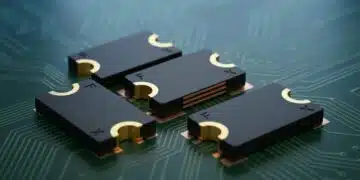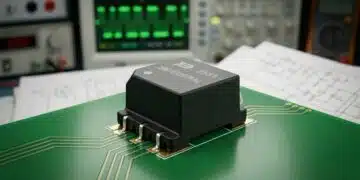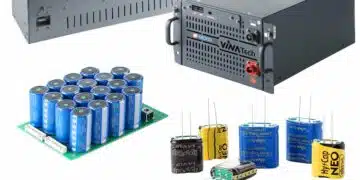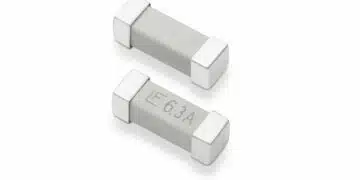This article provides an overview how silicon capacitors are driving next‑generation miniaturized electronics by offering high reliability, low ESR, and superior performance for industries like 5G, automotive, medical, and aerospace.
Their growing adoption is enabling advanced applications in AI, IoT, edge computing, and system‑in‑package designs, with the market expected to expand steadily through 2032.
In an era where electricity rules and every millimeter of circuit board space matters, the silicon capacitor is the invisible force that is building a new milestone in the electronics world.
The use of 5G smartphones to implantable devices would not have been possible without these ultra-compact, high-performance materials. They are actually redefining what’s possible in miniaturization and reliability. While conventional capacitors have long been the workhorses in developing powerful electronics, they are hindering the path to produce modern compact miniaturized electronics, where silicon capacitors perform best.
Silicon Capacitor: The Prime Foundation of Next-Gen Miniaturization Devices Development
As technology advanced to AI, IoT, and 5G services, the demand for compact, efficient, and faster electronic devices has increased. Conventional capacitor technologies struggle to deliver consistent performance as device geometries shrink. Here, silicon capacitors, built using semiconductor-grade fabrication processes, excel. They have multiple characteristics like stable behavior, high Q-factor, and low equivalent series resistance (ESR) in wide operating temperature range that outperform traditional capacitors.
According to the market experts, silicon capacitors will grow at a CAGR of 5% by 2032 and reach to billion-dollar revenue. The factors that made this industry coveted worldwide are its higher adoption in RF modules, high-speed data transceivers, and advanced packaging. As silicon capacitors are gaining higher popularity globally, major key players from different countries are increasing their manufacturing capacities. Some of the recent advancements of the major companies are listed below.
| Country | Key Player | Development |
|---|---|---|
| Japan | Murata Manufacturing Co., Ltd. | Opened a 200-mm (8″) silicon-capacitor mass-production line |
| South Korea | Samsung Electro-Mechanics Co. | Started commercial supply of silicon capacitors |
| United States | Empower Semiconductor | Developed an ultra-low ESL silicon capacitor (EC1005P) for an AI delivery application |
| China | Moriamu and other domestic vendors | Scaling silicon-capacitor production |
These capacitors are not merely substitutes; they are enablers for the next generation of heterogeneous integration and system-in-package (SiP) designs.
How Silicon Capacitors Are Making an Impact in Different Industries?
The unique properties of silicon capacitors are being valued in a myriad of industries. Here are a few industries that leverage silicon capacitors.
- 5G Network and Telecommunication Industry
The recent projection shared that 5G will have 5.3 billion subscriptions and around 85% population coverage by the end of 2029. As network devices transform to support the massive data created by the larger online population and higher frequency, stability, and accuracy are highly important. To provide faster network service, providers often incorporate silicon capacitors in 5G base stations, small cells, and RF front-end modules due to their higher frequency capacity. A recent example of this is found when Murata Manufacturing and STMicroelectronics both expanded their RF-capable silicon capacitor lines. It helped them to enhance performance for millimeter-wave communication systems and compact antenna modules used in next-generation smartphones.
- Automotive & Electric Mobility
Modern vehicles are an optimal example of luxury, but to provide ultimate comfort and experience to the customer, they highly depend on electronics. From ADAS to infotainment and for managing EV batteries, it requires smaller and compact devices. Silicon capacitors are proven to be the most efficient components in these vehicles because of their higher temperature control, power, and resistance to chemical stress. For instance, TDK Corporation and Vishay Intertechnology started to co-develop automotive-grade silicon capacitors designed for high-reliability domains, which comprise radar sensors and powertrain control units.
- Medical Equipment & Healthcare Industry
The healthcare technology is upgrading rapidly. The sector is investing in more compact and interconnected tools where silicon capacitors are indispensable. They are eco-friendly substances, small in size, and trustworthy nature, making them perfect to use in implantable and portable systems. Miniaturized pacemakers, neural implants, and biosensors, these advanced medical devices rely heavily on silicon capacitors for steady electricity delivery and data signal conditioning. Major medical equipment giants, comprising Microchip Technology and STMicroelectronics, started including silicon-based passive elements into system-in-chip (SoC) solutions for medical wearables.
- Aerospace & Defense
Aerospace and defense is an industry where reliability is paramount. The electronics and space systems used here require products that can withstand radiation and extreme conditions. In some major electronics devices, including satellite communications, radar modules, and avionics, the manufacturers trust silicon capacitors due to their radiation hardness and low aging rate. European Space Agency (ESA)-approved silicon capacitors from manufacturers like IPDiA (Murata Integrated Passive Solutions) are now standard in satellite payloads due to their proven endurance under cosmic radiation.
- Advanced Computing & AI
As CPUs and GPUs are becoming popular, their electricity delivery network requires capacitors with ultra-low impedance to limit noise and impede voltage droops. Silicon capacitors can be placed near or on the top to provide rapid charge to the chips for uninterrupted operation, which is integral in IT and data centers.
Final Thought
The transformation of semiconductors, communication technologies, and energy systems will lead the future electronics, and silicon capacitors will be the core of it. Industry experts are expecting an extensive adoption of them in hardware of edge computing, IoT nodes, quantum processors, and medical microelectronics devices. Because here size and stability are non-negotiable factors. Silicon capacitors are not just participating in the future advancements in electronics; they are actively accelerating them.
Source: https://www.researchnester.com/reports/silicon-capacitors-market/8137































